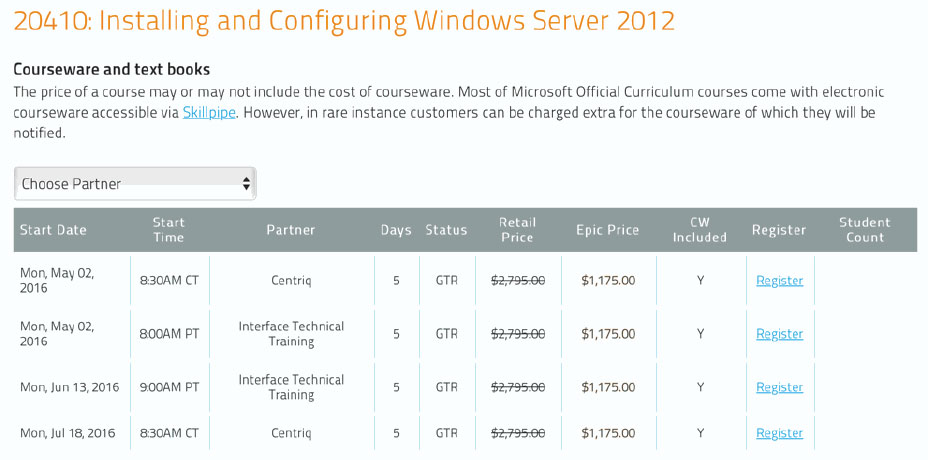TTCP2150: Intermediate C++ 20 Programming / Effective C++
About this Course
C++ is a powerful, high-performance programming language that offers an ideal blend of low-level memory manipulation and high-level abstraction capabilities. Learning C++ is a valuable investment for developers, as it opens the door to creating efficient, versatile, and complex applications that run on a variety of platforms. Modern companies across diverse industries – including finance, gaming, automotive, and telecommunications – rely on C++ for developing performance-critical applications, system software, and embedded systems. Renowned organizations like Google, Facebook, and Microsoft continue to leverage the power of C++ in their development practices, solidifying its status as a crucial skill for developers seeking lucrative and challenging career opportunities.
Geared for experienced C++ developers, Intermediate C++ 20 / Effective C++ 20 is a four day, hands-on program that dives covers a broad spectrum of topics – from the quick review of C++ essentials to modern C++ features, memory management, unit testing, and more. Our expert instructors will walk you through a comprehensive journey, investigating cutting-edge concepts such as RAII, copy and move semantics, namespaces, templates, and C++ 20 Concepts & auto Templates. You’ll learn to leverage the power of modern C++ and unravel the intricacies of memory management, including the handle/body pattern, smart pointers, and move constructors. By the end of this course, you’ll have an in-depth understanding of C++ memory, pointers, and complexity.
Working in a hands-on environment, explore the art of functional programming and discover how the IoC pattern, dependency injection, functors, and lambda expressions can bring about significant enhancements to your code. With a strong emphasis on SOLID principles, inheritance, polymorphism, exceptions, and operator overloading, this course will help you design robust, maintainable, and scalable modern applications. You’ll also expand your C++ toolset by exploring the rich offerings of the Standard Library, mastering the essentials of containers, algorithms, numerics, dates, and times. Gain a solid introduction to multitasking with threads, tasks, and async. As a bonus, you’ll also learn how to implement effective unit testing in C++ using GTest, ensuring your code is reliable and bug-free.
Join our immersive training experience and become an adept C++ developer with unparalleled skills in the latest C++ 20 programming techniques. This fast-paced, lab-intensive course is designed to equip you with the knowledge and confidence to tackle the most challenging C++ development projects.
Audience Profile
This is an intermediate level development course designed for developers with prior C++ programming experience. Students without prior C++ programming background should take the pre-requisite training.
At Course Completion
Working in a hands-on learning environment, guided by our expert team you’ll learn to:
· Master intermediate to advanced C++ 20 programming techniques, enabling the development of efficient and maintainable applications using the latest features and best practices.
· Acquire in-depth knowledge of memory management in C++, including the handle/body pattern, smart pointers, and move constructors, to optimize performance and minimize memory-related issues.
· Develop proficiency in functional programming with C++, incorporating concepts such as dependency injection, functors, and lambda expressions to enhance code flexibility and modularity.
· Gain expertise in utilizing the C++ Standard Library for generic programming, mastering the use of containers, algorithms, numerics, and other features to create powerful, reusable code components.
· Learn to implement effective unit testing in C++ using GTest, ensuring the reliability and robustness of your applications through rigorous testing methodologies.
· Understand the basics of multitasking in C++, exploring threads, tasks, and async for concurrent programming, empowering developers to create scalable and high-performance applications.
Outline
1. Quick Review of C++
· Implementing a basic O-O design
· Implementing Classes
· Visibility & friends
· File organization
· C++ types – structs, classes, interfaces, enums
2. Modern C++
· New features in C++ 11,14,17,20
· RAII - Modern memory management in C++ - overview
· Copy vs Move semantics
· Namespaces
· Strings
· Input & Output
· Implementing a linked-list – a demonstration of class, memory, pointers and complexity
3. Templates
· General Purpose Functions
· Function Templates
· Template Parameters
· Template Parameter Conversion
· Function Template Problem
· Generic Programming
· General Purpose Classes
· Class Templates
· Class Template Instantiation
· Non-Type Parameter
· C++ Containers overview
· C++ 20 concepts & auto Templates
4. Memory Management
· The handle/body (Bridge) pattern
· Using strings effectively
· Smart Pointers
· Move constructor in depth
· Other
5. Unit Testing in C++
· Unit testing – Quick Overview
· Unit testing in C++
· Using GTest
6. Inheritance and Polymorphism
· Inheritance Concept
· Inheritance in C++
· Virtual Function Specification
· Invoking Virtual Functions
· VTable
· Virtual Destructors
· Abstract Class Using Pure Virtual Function
· Design for Polymorphism
· Interfaces
· Design for Interface
· A SOLID introduction
7. Exceptions
· Review of the basics: try, catch, throw
· The throws declaration in modern C++
· Using noexcept
· Overriding terminate
8. Operator Overloading & Conversion
· Basics
· Essential Operators
· Conversion Operators
· Constructor as conversion
· Explicit vs Implicit conversion
9. Functional Programming
· The IoC pattern
· Dependency Injection
· Functions as objects
· IoC via interface
· Functors
· IoC with Functors
· Implementing Functors
· Function Pointers
· IoC with Function Pointers
· Lambda Expressions
· Lambda Syntax
· IoC with Lambdas
10. Standard Library
· Perspective
· History and Evolution
· New Features
· Generic Programming
· Containers
· Algorithms
· Numerics
· Dates & Times
· Initializer List
11. Introduction to Multitasking
· Threads
· Tasks
· Async
Prerequisites
Incoming students should have practical skills equivalent to the topics in, or should have recently attended, one of these courses as a pre-requisite:
· TTCP2100: Introduction to C++ Programming

